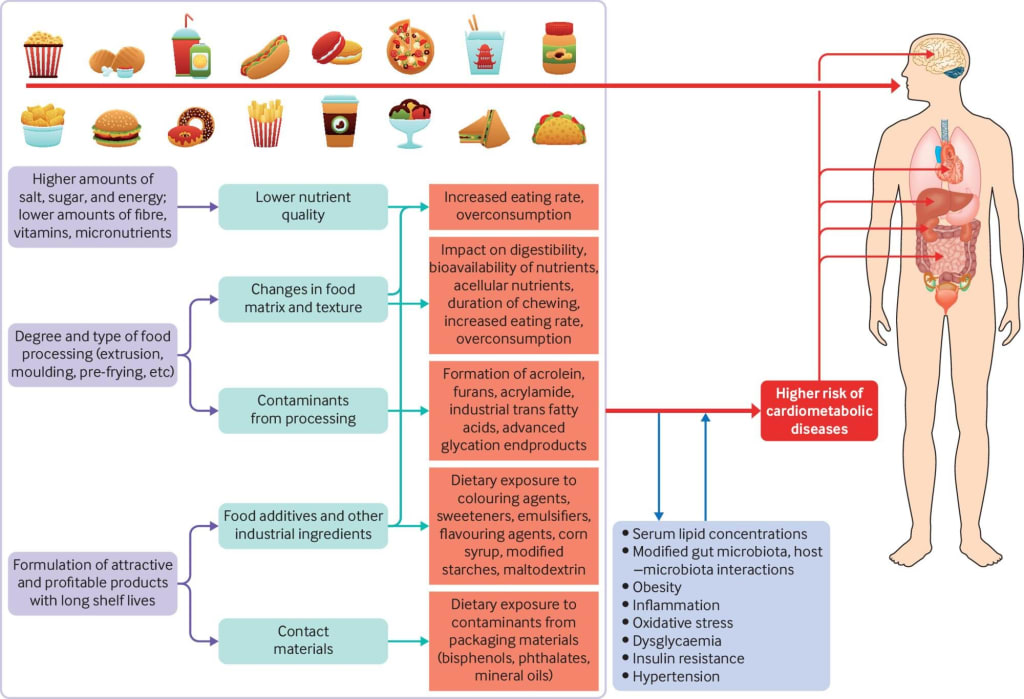Researchers Call for Public Awareness of Adverse Effects of Ultra-Processed Foods
Ultra-Processed Foods

Introduction: A team of researchers from the Université Sorbonne Paris Nord and Université Paris Cité, France, has highlighted the pressing need to inform the public about the adverse health effects associated with ultra-processed foods. In their paper, titled "Ultra-Processed Foods and Cardiometabolic Health: Public Health Policies to Reduce Consumption Cannot Wait," published in BMJ, the authors emphasize that while there is compelling evidence linking processed foods to health risks, efforts to reduce or eliminate these products lack sufficient support. They underscore the urgency of public health policies to address the consumption of ultra-processed foods, which have been linked to various health issues, including altered lipoprotein profiles, obesity, type 2 diabetes, and cardiovascular diseases.
The Challenge of Nutrient-Based Perspective: The authors note that many studies assessing the effects of diet on health typically focus on nutrient-based perspectives, considering factors such as total fat, saturated fat, dietary cholesterol, calories, sugar, salt, dietary fiber, vitamins, and minerals. However, this approach often fails to differentiate the intensity of food processing, which is a crucial determinant of health outcomes. For example, a nutritional study may treat industrially processed vegetable soup the same as homemade soup, disregarding the health risks associated with industrial processing, additives, and non-domestic ingredients.
Consistent Findings of Health Risks: Over 70 long-term epidemiological studies consistently link the consumption of ultra-processed foods to weight gain and an increased risk of various diseases, particularly cardiometabolic conditions. Some researchers argue that these foods meet the criteria for being labeled as addictive substances, similar to tobacco products. To help consumers make informed choices, the authors propose the inclusion of warning labels on ultra-processed foods, raising awareness about their health implications.
Recommendations for Addressing the Issue: The authors suggest a multi-pronged approach to tackle the problem of ultra-processed foods:
Government Policies and Regulations: They recommend implementing government policies and regulations to promote the production and availability of minimally processed foods. This would limit the marketing of ultra-processed foods and provide consumers with healthier options.
Consumer Education: Educating consumers about the adverse effects of ultra-processed foods is essential. Public health outreach should help citizens identify these foods and make informed dietary choices.
Independent Research: The authors stress the need for independent, publicly funded research to identify specific processes and substances contributing to the adverse effects of ultra-processed foods. Some known toxins present in these foods include furans, heterocyclic amines, polycyclic aromatic hydrocarbons, acrolein, advanced glycation end products, industrial trans-fatty acids, and acrylamide.
Contaminants and Additives: Ultra-processed foods with longer shelf lives may leach contaminants, such as phthalates, bisphenols, mineral oils, and microplastics, from packaging. Studies suggest these contaminants have carcinogenic properties and are associated with cardiovascular disease, obesity, insulin resistance, and type 2 diabetes. The numerous food additives in these products may also have detrimental effects, including inflammation, DNA damage, and disruptions in gut microbiota.
Understanding Ultraprocessed Foods: The classification of what constitutes a UPF was initially established in 2009 by Brazilian researchers using the NOVA food classification system. This system categorizes food and beverages into four groups:
Unprocessed and minimally processed foods, including items like fruits, vegetables, milk, and meat.
Processed culinary ingredients, which encompass white sugar, butter, and oils derived from seeds, nuts, and fruits.
Processed foods, such as tomato paste, bacon, canned tuna, and wine.
Ultraprocessed foods, which include items like soda, ice cream, breakfast cereal, and prepackaged meals.
Concerns Surrounding UPFs, Particularly in Youth: The health implications of UPFs are raising concerns, especially when it comes to their consumption by young people. Data from the National Health and Nutrition Examination Survey revealed that between 1999 and 2018, highly processed foods constituted the majority of energy intake in individuals aged 2–19 years.
Controversy Over Aspartame: One of the most commonly used additives in UPFs, the artificial sweetener aspartame, made headlines recently when the World Health Organization (WHO) classified it as a probable carcinogen in humans. Aspartame is an ingredient found in numerous products, including soda, chewing gum, and chewable vitamins.
The US Food and Drug Administration (FDA) sharply disagreed with the WHO's assessment, maintaining its recommended daily limit of 50 mg/kg of body weight as a safe level for human consumption. This amount equates to approximately 75 packets of the sweetener Equal.
FDA officials defended their position by highlighting that aspartame is one of the most extensively studied food additives in the human food supply. They expressed confidence in its safety when used within approved conditions, pointing out "significant shortcomings" in the studies used by the WHO to support its new classification.
Conclusion: In their concluding remarks, the authors stress the urgency of taking action to address the consumption of ultra-processed foods, stating that "everyone's health is at stake." By raising public awareness and implementing effective policies, there is hope for reducing the health risks associated with these highly processed products and promoting better dietary choices for all.
About the Creator
Shirsendu Chakma
I want to see you with my two eyes 💔😢😭






Comments
There are no comments for this story
Be the first to respond and start the conversation.